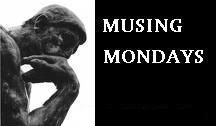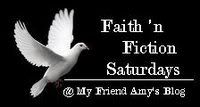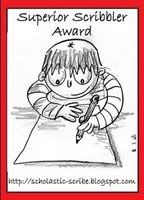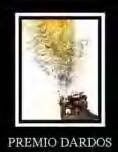Sticky Note
Monday, September 29, 2008
Musing Monday
Today’s MUSING is just going to be a simple one on reading…
WHAT ARE YOU READING RIGHT NOW?
Home Another Way by Christa Parrish
WHY ARE YOU READING WHAT YOU’RE READING? PLEASURE? FOR REVIEW? SOMETHING ELSE?
Reading this one for review
WHAT DID YOU RECENTLY FINISH READING?
Just finished reading Love Starts With Elle by Rachel Hauck...will post the review soon.
WHAT DO YOU THINK YOU’LL BE READING NEXT?
Either A Beautiful Fall by Chris Coppernoll or Having a Mary Spirit by Joanna Weaver...both for review. (Although I just got The Shack and can't wait to read it!)
WHAT WAS THE BEST BOOK YOU READ THIS MONTH? WHY?
Has to be a toss up with Sweet Caroline or Love Starts With Elle, both by Rachel Hauck
WHAT WAS THE WORST BOOK YOU READ THIS MONTH? WHY?
Well, it wasn't "bad" but I guess I liked it least...Before the Dawn by Carolyne Aarsen (it's the first book in the Guidepost series Home to Heather Creek. I reviewed the second book, Sweet September, and I liked it a lot better than Before the Dawn.)
Check out more of this week's Musing Mondays here!
Thursday, September 25, 2008
What is up with this blog, anyway?
But, I do CFBA reviews (as well as others) and as much as I tried to get it switched over here, it's just not gonna happen. I had jumped in and thought if I build it, they'll let me do it. Nope.
Then I had to decide if I still wanted to even keep the book blog. I mean, it's fun and I like it but do I really want to divide up my book stuff between two blogs? How confusing is that?
Well, we'll see but for now I'm keeping it. Besides, this allows me to also talk about books I read that are not for review and connect with other book bloggers! And I know that some people don't really give a rip about books, so they will just want to check out what's going on with our family. And some people may not give a rip about my personal life, they just want to hear about books. It's all fine and good!
I might be the only one reading my book blog, but that's ok because as a mom of 4 there just aren't a lot of "just for me" things right now...and that's really fine because I love my kids and I know the time I have with them is short since they grow so fast.
I've always loved books and loved reading, but since I went to college I had rarely read a book for the fun of it. I was either reading textbooks, trying to pass my classes (or making procrastination runs to Wal-Mart to avoid studying)...or later on I was changing diapers and potty training, and moving and moving and moving.
I can't say things have necessarily slowed down for me, but I am able to pick up a book and enjoy it now and then. And now Mackenzie (9) is older and reading like crazy (that girl can READ!) it's fun to talk about what we're reading and hear the kinds of books she's interested in.
So, all that said, sometimes I'll do a book giveaway on my other blog and now you'll know why it's not over here instead. I'll let you know when I do them so you can take part if you'd like.
It just so happens...that I have a giveaway going on right now at my personal blog for The S.O.S. for PMS by Mary M. Byers. Go check it out and leave a comment on that post to enter the giveaway!
And...
There's another giveaway going on for Sweet September by Tricia Goyer. I'm not actually hosting the giveaway, but Tricia is and you can find out how to enter here.
Wednesday, September 24, 2008
Sweet Caroline
 I just finished reading Sweet Caroline by Rachel Hauck and it was so fun to read!
I just finished reading Sweet Caroline by Rachel Hauck and it was so fun to read!Caroline is somewhat of a people-pleaser. When there's a need she steps in to help without much thought to her own dreams. Her mother was flighty and ran off when she was younger, and Caroline desperately does not want to be like that. So she goes to the other extreme and becomes ultra-dependable.
She has lived in small town South Carolina all her life, but when a friend tells her of a job opportunity in Barcelona she decides to throw caution to the wind and go for it. But when the owner of the cafe where she works dies and leaves the cafe to her, it throws a big kink in her new plans. She feels the weight of responsibility to keep the cafe going and the other employees from loosing their jobs.
As if that's not enough, Deputy Sherriff J.D. Rand steals her heart and then her first love, Mitch O'Neal comes back to town. Who knew so much could happen in Smalltown, America! Caroline has some big decisions to make and she's going to need some big help.
I especially loved Caroline's humor and how her head and her heart would literally talk to each other in the middle of certain situations. I also like that Caroline is grounded and not flighty and helpless. The pain she's lived with because of her mother's abandonment guides all her decisions. It's made her who she is, but does she have to be controlled by it? She never understood the God-thing and I like how he got her attention.
I don't want to spoil the ending, but she had to make some really tough decisions and trust that they were all for the best. I think she made the right ones, but someone else may disagree. You'll have to let me know.
Tuesday, September 23, 2008
Shout Out
I won 5 books from some of the giveaways going on during that week! I'm so excited! I don't usually win...anything.
From Jen's Book Thoughts I won One Drop of Blood by Thomas Holland
From The Tome Traveller's Weblog I won two Jane Green books, Swapping Lives and Second Chance
From Planet Books I won Time Of My Life by Allison Winn Scotch
Oh and I just found out, from Scrub-a-Dub-Tub I won In The Beginning by Chuck Fischer
I can't wait to read them all! How fun!!
And now a BIG shout out to our host for BBAW, Amy at My Friend Amy. She did a fantastic job organizing all the events and I don't know how she's still standing! Thanks Amy for putting it all together and making it work!
Monday, September 22, 2008
Fall Into Reading Challenge 2008
Katrina over at Callapidder Days is once again hosting the Fall Into Reading Challenge. This is my first time to participate in one of her challenges, so I'm excited to join in on the fun!
Be sure to check it out to see what other people are reading and add your own list, too!
I know I'll have to do some tweaking, but here is what I have so far (click the links to see my reviews):
Fiction:Sweet Caroline by Rachel HauckLove Starts With Elle by Rachel HauckHome Another Way by Christa Parrish
One Drop of Blood by Thomas HollandThe Shack by William P. YoungTime of My Life by Allison Winn Scotch
The Spanish Bow by Andromeda Romano-LaxForsaken by James David Jordan
Non-fiction:S.O.S. For PMS by Mary M. Byers (review posted on my other blog)
Having a Mary Spirit by Joanna Weaver
(Oct 8 ~ updated to make some changes to my list)
Thursday, September 18, 2008
Try Dying/Try Darkness Winner

We have a winner!
Traci from Traci's Book Bag won the giveaway for James Scott Bell's Try Dying and Try Darkness books.
Congrats Traci! I'll email you shortly. I hope you enjoy the books.
Wednesday, September 17, 2008
Isolation by Travis Thrasher
If you like thrillers and chillers then I suggest you check out Isolation by Travis Thrasher. (And, by the way, what a great name for a suspense author! Yeah, I know. He doesn't just write suspense.)
Me? I have to say that I was too chicken to read this one. Yet. It sounds really good and I am going to read it, but considering Stan's been out of town a lot lately I didn't want to freak myself out without my big, strong man here to protect me from my imagination!
ABOUT THE AUTHOR: It was during third grade after a teacher encouraged him in his writing and as he read through The Narnia Chronicles by C.S. Lewis that Travis decided he wanted to be a writer. The dream never left him, and allowed him to fulfill that dream of writing fulltime in 2007.
It was during third grade after a teacher encouraged him in his writing and as he read through The Narnia Chronicles by C.S. Lewis that Travis decided he wanted to be a writer. The dream never left him, and allowed him to fulfill that dream of writing fulltime in 2007.
Travis Thrasher is the author of numerous works of fiction, including his most personal and perhaps his deepest work, Sky Blue, that was published in summer of 2007. This year he has to novels published, Out of the Devil’s Mouth, and a supernatural thriller, Isolation.
Travis is married to Sharon and they are the proud parents of Kylie, born in November, 2006, and Hailey, a Shih-Tzu that looks like an Ewok. They live in suburban Chicago.
ABOUT THE BOOK Trapped
Trapped
Exhausted
Terrified
. . . Alone
When a missionary family moves into a secluded mansion in the mountains of North Carolina, they think they are escaping their nightmares. But when a snowstorm hits and they are trapped inside their new home, their worst fears become reality. As they fight to stay alive, they will be tested in ways they never imagined. Can their love for one another and their faith in God save them from the dangers lurking here?
A masterfully written story that will grip you from its mysterious beginning to its chilling end.
From Publishers Weekly:
"In this dark chiller, Thrasher (Sky Blue; The Promise Remains) demonstrates a considerable talent for the horror genre. Like Stephen King, Thrasher pits flawed but likable characters against evil forces that at first seem escapable but gradually take on a terrifying ubiquity.
The Miller family has recently returned to suburban Chicago after a harrowing experience on the mission field. Hoping to get away from the busyness of suburban living, they travel to the mountains of North Carolina for an extended stay in an enormous, remote lodge where husband and father Jim plans to write a book while trying to reconnect with his family.
When a snowstorm isolates them further and spiritual attacks make them feel they are losing their minds, both Jim and his wife, Stephanie, begin to wonder if God can rescue them and their two young children. Aside from sharing too many plot points with The Shining, this novel hits very few false notes and should appeal to fans of Christian fiction, the horror genre and all who enjoy well-crafted and suspenseful stories."
If you would like to read the first chapter of Isolation, go HERE
Monday, September 15, 2008
My BBAW Giveaway

If you insist. You push too hard, dah-ling!
BBAW
Daily raffles and more BBAW info - from our gracious host!
List of book blogs participating in BBAW
Giveaways here and here - all week (lots of them!)
Awards - Wed/Thurs (see the best of the best)
GO HERE FOR MY GIVEAWAY! (drawing is on Thursday)
Giveaway at On My Bookshelf - come see!
Keep watching this sticky post for updates during the BBAW.
When Answers Aren't Enough: Experiencing God as Good When Life Isn't

It's the 15th, time for the Non~FIRST blog tour!(Join our alliance! Click the button!) Every 15th, we will featuring an author and his/her latest non~fiction book's FIRST chapter!
Zondervan (April 1, 2008)
ABOUT THE AUTHOR:
 Matt Rogers is copastor of New Life Christian Fellowship at Virginia Tech. Eight hundred students call it home.
Matt Rogers is copastor of New Life Christian Fellowship at Virginia Tech. Eight hundred students call it home.FROM THE BACK COVER:
On April 16, 2007, the campus of Virginia Tech experienced a collective nightmare when thirty-three students were killed in the worst massacre in modern U.S. history. Following that horrendous event, Virginia Tech campus pastor Matt Rogers found himself asking and being asked, “Where is God in all of this?” The cliché-ridden, pat answers rang hollow.
In this book, Matt approaches the pain of the world with personal perspective—dealing with his hurting community as well as standing over the hospital bed of his own father—and goes beyond answers, beyond theodicy, beyond the mere intellectual. When Answers Aren’t Enough drives deeper, to the heart of our longing, in search of a God we can experience as good when life isn’t.
Product Details
List Price: $14.99
Paperback: 224 pages
Publisher: Zondervan (April 1, 2008)
Language: English
ISBN-10: 0310286816
ISBN-13: 978-0310286813
AND NOW...THE FIRST CHAPTER:

Sinking Sadness
Embracing the World That Is
One
Lately I’ve been walking in the evenings. I tend to do that when stuck on a question. Maybe I’m trying to walk it off. On days when I have time, I drive out to Pandapas Pond in Jefferson National Forest to be in nature. Once there, I set off through the woods or slowly stroll along the water’s edge, deep in thought or prayer.
Most days, because of time, I have to settle for the streets around my home. I can quickly climb to the top of Lee Street, turn around, and look out over Blacksburg, the Blue Ridge backlit by the setting sun. From there, I can see much of Virginia Tech. The stately bell tower of Burruss Hall rises proudly above the rest.
On nights like tonight, when I get a late start and the sun is already down, I head for campus. At its center, separating the academic and residential sides of the school, sits the Drill Field, a wide-open grassy space named for the exercises that the Corps of Cadets practices to perfection there. After dark, old iron lampposts, painted black, blanket the ground in overlapping circles of light.
It was here on the Drill Field, the day after the shootings, that students placed thirty-two slabs of gray limestone rock — Hokie stones, as they’re called — in a semicircle in front of Burruss Hall, to commemorate the lives of loved ones lost. Thousands of mourners descended on the place, bearing with them a flood of condolences, a mix of bouquets, balloons, and poster-board sympathies. They came sniffling, clinging to tissues and to one another, and lifting their sunglasses to wipe tears from their tired, red eyes. The world came as well, vicariously through television, watching us, kneeling with us in grief.
I also came, revisiting the stones day after day, and sometimes at night, drawn to them by a need to connect with the dead whom I never knew. Always there was something new here, some trinket that had been added. At times the items seemed odd: a baseball for every victim, an American flag by every stone, though some of the dead were international students.
People took their time passing by this spot. There was no need to rush; there were no classes to attend. It would be days, dark and long, before there would be any distractions from the pain. For a time, there was no world beyond this place.
By day, soft chatter could be heard around the memorial. After sunset, no one spoke a word. During daylight, masses huddled near the stones, peering over shoulders to read the notes left there. At night, however, mourners passed by in a single-file line, waiting their turn, patient with the people in front who wished to pause at every name.
The masses have since receded. The Drill Field now is vacant (except for these stones) and silent. The semester has ended, most of the students are gone, and only the sounds of insects disturb the stillness of the summer evening air. If I close my eyes and take in the quiet, I can almost imagine nothing happened here.
Almost. Except for the stone reminders that lie at my feet. On one is written a simple, anguished note.
Jeremy,
We love you.
Mom and Dad
These stones are more than rocks. Each is all that remains of a son, a daughter, a husband who will never come home again. I picture my mom and dad, heartbroken, kneeling by a stone for me, had I been among the dead. Moreover, I imagine myself by a stone for my dad, had he not survived his fall.
This is a summer of mourning. I am grieving the world as it is. And I am asking, “If I embrace the world as it is, in all its sadness — if I refuse to bury my head in the sand, pretending all is well, but rather think and speak of the world as it actually is — can I, then, still know God as good? Can my experience of him be more consistent than my circumstances, which alternate between good and bad?”
Is this too much to expect?
Before I can know, I must face the world at its worst.
Saturday, September 13, 2008
The Official BBAW Giveaway List

In The Shadow Of Lions
Welcome to the blog tour for In The Shadow Of Lions by Ginger Garrett! After you get a feel for the book and the author, be sure to read my thoughts at the end.
ABOUT THE AUTHOR: Ginger Garrett is the critically acclaimed author of Chosen: The Lost Diaries of Queen Esther, which was recognized as one of the top five novels of 2006 by the ECPA, and Dark Hour. An expert in ancient women's history, Ginger creates novels and nonfiction resources that explore the lives of historical women.
Ginger Garrett is the critically acclaimed author of Chosen: The Lost Diaries of Queen Esther, which was recognized as one of the top five novels of 2006 by the ECPA, and Dark Hour. An expert in ancient women's history, Ginger creates novels and nonfiction resources that explore the lives of historical women.
Her newest release is Beauty Secrets of the Bible, (September 11, Thomas Nelson) based on the historical research that began in her work on Chosen. The book explores the connections between beauty and spirituality, offering women both historical insights and scientific proofs that reveal powerful, natural beauty secrets.
A frequent radio guest on stations across the country, including NPR and Billy Graham's The Hour of Decision, Ginger is also a popular television guest. Her appearances include Harvest Television, Friends & Neighbors, and Babbie's House. Ginger frequently serves as a co-host on the inspirational cable program Deeper Living.
In 2007, Ginger was nominated for the Georgia Author of the Year Award for her novel Dark Hour. When she's not writing, you may spy Ginger hunting for vintage jewelry at thrift stores, running (slowly) in 5k and 10k races, or just trying to chase down one of her errant sheepdogs. A native Texan, she now resides in Georgia with her husband and three children.
ABOUT THE BOOK
"I am the first writer, The Scribe. My books lie open before the Throne, and someday will be the only witness of your people and their time in this world."
So begins the narration of one such angel in this sweeping historical tale set during the reign of England's Henry VIII. It is the story of two women, their guardian angels, and a mysterious, subversive book ... a book that outrages some, inspires others, and launches the Protestant Reformation.
The devout Anne Boleyn catches the eye of a powerful king and uses her influence to champion an English translation of the Bible. Meanwhile, Rose, a broken, suicidal woman of the streets, is moved to seek God when she witnesses Thomas More's public displays of Christian charity, ignorant of his secret life spent eradicating the Bible, persecuting anyone who dares read it.
Historic figures come alive in this thrilling story of heroes and villains, saints and sinners, angels and mortals ... and the sacred book that will inspire you anew. Fans of Francine Rivers and Karen Kingsbury will love Ginger's intriguing combination of rich character development, artful settings, and inspiring historical insights.
If you would like to read an excerpt from In The Shadow Of Lions, go HERE
My thoughts:
Wow! Ginger Garrett takes a subject that we've all studied about at one time or another in school (whether or not we remember it is another matter...ahem! I admit, my memory was sketchy at best. I'll just chalk it up to too many diaper changes!).
Anne Boleyn. We've always known her as the deceitful and manipulative woman trying to get her hands on the crown.
But what if we were wrong?
That's what Ginger asks in this book. What if she was actually a martyr for getting God's word to the people? And as if that's not enough to get your attention, the way the story is told is phenomenal! At first I was completely confused about the Scribe, but once the stories started to unravel I couldn't wait to hear more. Basically, the Scribe gives a NYC editor a "second chance" by showing her Anne's and Rose's stories for her write. And what we get is very thought-provoking, both from the historical story lines and from the spiritual world.
Wednesday, September 10, 2008
Get Ready for Fall
It's almost time for Fall Into Reading 2008! If you haven't participated before, please join in!
Katrina over at Callapidder Days hosts a reading challenge each spring and fall. The challenge is just to get us reading. All you do is post what books you'd like to read this fall (even if it's only two of them), add your name to the Mr. Linky on her site, and then read!
This is a great way to connect with other readers and see what they are reading and encourage one another. And it's also a great way to eliminate some of your TBR pile.
The dates run from September 22 thru December 2o (you know...Fall!). To hear more about it and the details go check out Katrina's Fall Into Reading 2008 post here.
See you then!
Oh and did I mention there will be weekly giveaways...and a prize?
Tuesday, September 9, 2008
For the readers!!
Those of you who love to read, but don't necessarily blog. This is for you.
And this is all you have to do...
To enter, simply fill out the following sentence in 200 words or less and email them to Jennifer at - literatehousewife (at) gmail (dot)com:
"I read book blogs because..."
And that's it! What will you win, you ask? Well, books of course! Lots of books. There will be first, second and third place winners.
Go to The Literate Houeswife blog to get more details.
There are many, many book bloggers signed up for Book Blogger Appreciation Week, so be sure to check them out. But I'd also like to note that these bloggers write about all kinds of books, not just Christian fiction.
Friday, September 5, 2008
Book Blogger Appreciation Week

Wednesday, September 3, 2008
Back To Life by Kristin Billerbeck
ABOUT THE AUTHOR:
 Kristin Billerbeck was born in Redwood City, California. She went to San Jose State University and gained a bachelor's degree in Advertising, then worked at the Fairmont Hotel in PR, a small ad agency as an account exec, and then, she was thrust into the exciting world of shopping mall marketing.
Kristin Billerbeck was born in Redwood City, California. She went to San Jose State University and gained a bachelor's degree in Advertising, then worked at the Fairmont Hotel in PR, a small ad agency as an account exec, and then, she was thrust into the exciting world of shopping mall marketing.She got married, had four kids, and started writing romance novels until she found her passion: Chick Lit. She is a CBA bestselling author and two-time winner of the ACFW Book of the Year for What A Girl Wants in 2004, and again in 2006 for With this Ring. Featured in the New York Times, USA Today, World Magazine, The Atlanta Journal Constitution, Kristin has appeared on the Today Show. She is credited with jump-starting the inspirational chick-lit phenomenon. Most recently she has been names as a finalist for the Christy Award in the Lits category for The Trophy Wives Club.
Her other recent books include: She's All That.
ABOUT THE BOOK

Lindsey realized when she married Ron, a man 17 years her senior, that the odds were he’d see heaven before her, but she never expected to be a widow at 35. There’s too much of life left for her to just sit around in mourning. But she can’t seem to kick start the rest of her life.
That is until she gets some help from Ron’s first wife, Jane, who shows up unexpectedly at her door one day as the executor of her husband’s estate. Jane is everything Lindsey’s not… independent, stubborn… and a lot older. Plus she has one surprise after another… including a son named Ron Jr. (she insists he’s not “really” Ron’s son). But an unlikely friendship develops as each woman begins to reevaluate what is really important, and owns up to the mistakes they’ve made in the past.
Told in the alternating voices of Jane and Lindsey, and with the return of many of the witty characters of The Trophy Wives Club, this book is a lighthearted, relatable read for when life goes in a direction you never planned. With faith and friends, there’s always light at the end of the tunnel.
If you would like to read an excerpt of chapter 1 of Back To Life, go HERE
Tuesday, September 2, 2008
And The Winner Is...
Monday, September 1, 2008
The Summer the Wind Whispered My Name

It is time for the FIRST Blog Tour! On the FIRST day of every month we feature an author and his/her latest book's FIRST chapter!
and his book:
The Summer the Wind Whispered My Name
NavPress Publishing Group (August 2008)

Don Locke is an illustrator and graphic artist for NBC's Tonight Show with Jay Leno and has worked as a freelance writer and illustrator for more than thirty years. He lives in Southern California with his wife, Susan. The Summer the Wind Whispered My Name, prequel to The Reluctant Journey of David Connors, is Don's second novel.
Product Details:
List Price: $12.99
Paperback: 355 pages
Publisher: NavPress Publishing Group (August 2008)
Language: English
ISBN-10: 1600061532
ISBN-13: 978-1600061530
AND NOW...THE FIRST CHAPTER:

Until recently my early childhood memories weren’t readily available for recollection. Call it a defective hard drive. They remained a mystery and a void—a midwestern landscape of never-ending pitch-blackness where I brushed up against people and objects but could never assign them faces or names, much less attach feelings to our brief encounters.
But through a miraculous act of divine grace, I found my way back home to discover the child I’d forgotten, the boy I’d abandoned supposedly for the good of us both. There he sat beneath an oak tree patiently awaiting my return, as if I’d simply taken a day-long fishing trip. This reunion of spirits has transformed me into someone both wiser and more innocent, leaving me to feel both old and young.
And with this new gift of recollection, my memories turn to that boy and to the summer of 1960, when the winds of change blew across our rooftops and through the screen doors, turning the simple, manageable world of my suburban neighborhood into something unfamiliar, something uncomfortable. Those same winds blew my father and me apart.
One
Route 666
With a gentle shake of my shoulders, a kiss on my cheek, and the words It’s time whispered by my mom, I woke at five thirty in the morning to prepare for my newspaper route. Careful not to wake my older brother, Bobby, snoozing across the room, I slipped out of bed and stumbled my way into the hallway and toward the bathroom, led only by the dim glow of the nightlight and a familiarity with the route.
There on the bathroom floor, as usual, my mother had laid my clothes out in the shape of my body, my underwear layered on top. You’re probably wondering why she did this. It could have been that she severely underestimated my intelligence and displayed my clothes in this fashion in case there was any doubt on my part as to which articles of clothing went where on my body. She didn’t want to face the public humiliation brought on by her son walking out of the house wearing his Fruit of the Loom undies over his head. Or maybe her work was simply the result of a sense of humor that I missed completely. Either way, I never asked.
Mine was a full-service mom whose selfless measures of accommodation put the men of Texaco to shame. The fact that she would inconvenience herself by waking me when an alarm clock would suffice, or lay out my clothes when I was capable of doing so myself, might sound a bit odd to you, but believe me, it was only the tip of the indulgent iceberg. This was a woman who would cut the crust off my PB&J sandwich at my request, set my toothbrush out every night with a wad of Colgate laying atop the bristles, and who would often put me to sleep at night with a song, a prayer, and a back scratch. In the wintertime, when the wind chill off Lake Erie made the hundred-yard trek down to the corner to catch the school bus feel like Admiral Perry’s excursion, Mom would actually lay my clothes out on top of the floor heater before I woke up so that my body would be adequately preheated before stepping outside to face the Ohio cold. From my perspective my room was self-cleaning; toys, sports equipment, and clothes discarded onto the floor all found their way back to the toy box, closet, or dresser. I never encountered a dish that I had to clean or trash I had to empty or a piece of clothing I had to wash or iron or fold or put away.
I finished dressing, entered the kitchen, and there on the maroon Formica table, in predictable fashion, sat my glass of milk and chocolate long john patiently waiting for me to consume them. My mother, a chocoholic long before the word was coined, had a sweet tooth that she’d handed down to her children. She believed that a heavy dusting of white processed sugar on oatmeal, cream of wheat, or grapefruit was crucial energy fuel for starting one’s day. Only earlier that year I’d been shocked to learn from my third grade teacher, Mrs. Mercer, that chocolate was not, in fact, a member of any of the four major food groups.
Wearing a milk mustache and buzzing from my sugar rush, I walked outside to where the stack of Tribunes—dropped off in my driveway earlier by the news truck—were waiting for me to fold them.
More often than I ever cared to hear it, my dad would point out, “It’s the early bird that catches the worm.” But for me it was really those early morning summer hours themselves that provided the reward. Sitting there on our cement front step beneath a forty-watt porch light, rolling a stack of Tribunes, I was keenly aware that bodies were still strewn out across beds in every house in the neighborhood, lying lost in their dreamland slumber while I was already experiencing the day. There would be time enough for the sounds of wooden screen doors slamming shut, the hissing of sprinklers on Bermuda lawns, and the songs of robins competing with those of Elvis emanating from transistor radios everywhere. But for now there was a stillness about my neighborhood that seemed to actually slow time down, where even the old willow in our front yard stood like one more giant dozing on his feet, his long arms hanging lifeless at his sides, and where the occasional shooting star streaking across the black sky was a confiding moment belonging only to the morning and me.
From the porch step I could detect the subtle, pale peach glow rise behind the Finnegan’s house across the street. I stretched a rubber band open across the top of my knuckles, spread my fingers apart, and slid it down over the length of the rolled paper to hold it in place. Seventy-six times I’d repeat this act almost unconsciously. There was something about the crisp, cool morning air that seemed to contain a magical element that when breathed in set me to daydreaming. So that’s just what I did . . . I sent my homemade bottle rocket blasting above the trees and watched as the red and white bobber at the end of my fishing pole suddenly got sucked down below the surface of the water at Crystal Lake, and with my Little League team’s game on the line, I could hear the crack of my bat as I smacked a liner over the third baseman’s head to drive in the go-ahead run. Granted, most kids would daydream bigger—their rockets sailed to the moon or Mars, and their fish, blue marlins at least, were hooked off Bermuda in their yachts, and their hits were certainly grand slams in the bottom of the ninth to win the World Series for the Reds—but my dad always suggested that a dream should have its feet planted firmly enough in reality to actually have a chance to come true one day, or there wasn’t much point in conjuring up the dream in the first place. Dreaming too big would only lead to a lifetime scattered with the remnants of disappointments and heartbreak.
And I believed him. Why not? I was young and his shadow fell across me with weight and substance and truth. He was my hero. But in some ways, I suppose, he was too much like my other heroes: Frank Robinson, Ricky Nelson, Maverick. I looked up to them because of their accomplishments or their image, not because of who they really were. I didn’t really know who they were outside of that. Such was the case with my dad. He was a great athlete in his younger years, had a drawer full of medals for track and field, swimming, baseball, basketball, and a bunch from the army to prove it.
It was my dad who had managed to pull the strings that allowed me to have a paper route in the first place. I remember reading the pride in his eyes earlier in the spring when he first told me I got the job. His voice rose and fell within a wider range than usual as he explained how I would now be serving a valuable purpose in society by being directly responsible for informing people of local, national, and even international events. My dad made it sound important—an act of responsibility, being this cog in the wheel of life, the great mandala. And it made me feel important, better defining my place in the universe. In a firm handshake with my dad, I promised I wouldn’t let him down.
Finishing up folding and banding the last paper, I knew I was running a little late because Spencer, the bullmastiff next door, had already begun to bark in anticipation of my arrival. Checking the Bulova wristwatch that my dad had given me as a gift the morning of my first route confirmed it. I proceeded to cram forty newspapers into my greasy white canvas pouch and loop the straps over my bike handles. Riding my self-painted, fluorescent green Country Road–brand bike handed down from my brother, I would deliver these papers mostly to my immediate neighborhood and swing back around to pick up the final thirty-six.
I picked the olive green army hat up off the step. Though most boys my age wore baseball caps, I was seldom seen without the hat my dad wore in World War II. Slapping it down onto my head, I hopped onto my bike, turned on the headlight, and was off down my driveway, turning left on the sidewalk that ran along the front of our corner property on Willowcreek Road.
I rode around to where our street dead-ended, curving into Briarbrook. Our eccentric young neighbors, the Springfields, lived next door in a house they’d painted black. Mr. and Mrs. Springfield chose to raise a devil dog named Spencer rather than experiencing the joy of parenthood. Approaching the corner of their white picket fence on my bike, I could see the strong, determined, shadowy figure of that demon dashing back and forth along the picket fence, snarling and barking at me loudly enough to wake the whole neighborhood. As was my custom, I didn’t dare slow down while I heaved the rolled-up newspaper over his enormous head into their yard. Spencer sprinted over to the paper and pounced on it, immediately tearing it to shreds—a daily reenactment. The couple insisted that I do this every day, as they were attempting to teach Spencer to fetch the morning paper, bring it around to the back of the house where he was supposed to enter by way of the doggy door, and gently place the newspaper in one piece on the kitchen table so it would be there to peruse when they woke for breakfast.
Theirs was one of only two houses in the neighborhood that were fenced in, a practice uncommon in the suburbs because it implied a lack of hospitality. Even a small hedge along a property line could be interpreted as stand-offish. The Springfields’ choice of house color wasn’t helpful in dispelling this notion. And yet it was a good thing that they chose to enclose their property because we were all quite certain that if Spencer ever escaped his yard, he would systematically devour every neighborhood kid, one by one. The strange thing was that the picket fence couldn’t have been more than three feet high, low enough for even a miniature poodle to clear—so why hadn’t Spencer taken the leap? Could it be that he was just biding his time, waiting for the right moment to jump that hurdle? So I was thankful for the Springfields’ ineptitude when it came to dog training because it allowed me to buffer Spencer’s appetite, knowing that whenever he did decide to make his move, I would most likely be the first course on the menu.
The neighborhood houses on my route were primarily ranch style, third-little-pig variety, and always on my left. On my left so that I could grab a paper out of my bag and heave it across my body, allowing for more mustard on my throw and more accuracy than if I had to sling it backhand off to my right side. This technique also helped build up strength in my pitching arm. I always aimed directly toward the middle of the driveway instead of anywhere near the porch, which could, as I’d learned, be treacherous territory. An irate Mrs. Messerschmitt from Sleepy Hollow Road once dropped by my house, screaming, “You’ve murdered my children! You’ve murdered my children!” Apparently I’d made an errant toss that tore the blooming heads right off her precious pansies and injured a few hapless marigolds. From that day on I shot for the middle of the driveway, making sure no neighbors’ flowers ever suffered a similar fate at my hands.
I passed my friend Mouse Miller’s house, crossed the street, and headed down the other side of Briarbrook, past Allison Hoffman’s house—our resident divorcée. All my friends still had their two original parents and family intact, which made Mrs. Hoffman’s status a bit of an oddity. Maybe it was the polio scare that people my parents’ age had had to live through that appeared to make them wary of any abnormality in another human being. It wasn’t just being exposed to the drug addicts or the murderers that concerned them, but contact with any fringe members of society: the divorcées and the widowers, the fifty-year-old bachelors, people with weird hairdos or who wore clothing not found in the Sears catalogue. People with facial hair were especially to be avoided.
You didn’t want to be a nonconformist in 1960. Though nearly a decade had passed, effects of the McCarthy hearings had left some Americans with lingering suspicions that their neighbor might be a Red or something worse. So everyone did their best to just fit in. There was an unspoken fear that whatever social dysfunction people possessed was contagious by mere association with them. I had a feeling my mom believed this to be the case with Allison Hoffman—that all my mother had to do was engage in a five-minute conversation with any divorced woman, and a week or so later, my dad would come home from work and out of the blue announce, “Honey, I want a divorce.”
Likely in her late twenties, Mrs. Hoffman was attractive enough to be a movie star or at least a fashion model—she was that pretty. She taught at a junior high school across town, but for extra cash would tutor kids in her spare time. Despite her discriminating attitude toward Mrs. Hoffman, my mother was forced to hire her as a tutor for my sixteen-year-old brother for two sessions a week, seeing as Bobby could never quite grasp the concept of dangling participles and such. Still, whenever she mentioned Mrs. Hoffman’s name, my mom always found a way to justify setting her Christian beliefs aside, calling her that woman, as in, “just stay away from that woman.” Mom must have skipped over the part in the Bible where Jesus healed the lepers. Anyway, Mrs. Hoffman seemed nice enough to me when I’d see her gardening in her yard or when I’d have to collect newspaper money from her; a wave and smile were guaranteed.
I delivered papers down Briarbrook, passed my friend Sheena’s house on the cul-de-sac, and went back down to Willowcreek, where I rolled past the Jensens’ vacant house. The For Sale sign had been stuck in the lawn out front since the beginning of spring. I’d seen few people even stop by to look at the charming, white frame house I remember as having great curb appeal. Every kid on the block was rooting for a family with at least a dozen kids to move in to provide some fresh blood.
A half a block later, I turned the corner and was about to toss the paper down Mr. Melzer’s drive when I spotted the old man lying under his porch light, sprawled out on the veranda, his blue overall-covered legs awkwardly dangling down the front steps of his farm house. I immediately stood up on my bike, slammed on the brakes, fish-tailed a streak of rubber on the sidewalk, dumped the bike, and rushed up to his motionless body. “Mr. Melzer! Mr. Melzer!” Certain he was dead, I kept shouting at him like he was only asleep or deaf. “Mr. Melzer!” I was afraid to touch him to see if he was alive.
The only dead body I had touched up till then was my great-uncle Frank’s at his wake, and it was not a particularly pleasant experience. I was five years old when my mom led me up to the big shiny casket where I peered over the top to see the man lying inside. Standing on my tiptoes, I stared at Frank’s clay-colored face, which I believed looked too grumpy, too dull. While alive and kicking, my uncle was an animated man with ruddy cheeks who spoke and reacted with passion and humor, but the expression he wore while lying in that box was one that I’d never seen on his face before. I was quite sure that if he’d been able to gaze in the mirror at his dead self with that stupid, frozen pouting mouth looking back at him, he would have been humiliated and embarrassed as all get out. And so, while no one watched, I started poking and prodding at his surprisingly pliable mouth, trying to reshape his smile into something more natural, more familiar, like the expression he’d worn recalling the time he drove up to frigid Green Bay in a blizzard to watch his beloved Browns topple Bart Starr and the Green Bay Packers. Or the one he’d displayed while telling us what a thrill it was to meet Betty Grable at a USO function during the war, or the grin that always appeared on his face right after he’d take a swig of a cold beer on a hot summer day. It was a look of satisfaction that I was after, and was pretty sure I could pull it off. Those hours of turning shapeless Play-Doh into little doggies and snowmen had prepared me for this moment.
After a mere twenty seconds of my molding handiwork, I had successfully managed to remove my uncle’s grim, lifeless expression. Unfortunately I had replaced it with a hideous-looking full-on smile, his teeth beaming like the Joker from the Batman comics. Before I could step back for a more objective look, my Aunt Doris let out a little shriek behind me; an older gentleman gasped, which brought my brother over, and he let out a howl of laughter, all followed by a flurry of activity that included some heated discussion among relatives, the casket’s being closed, and my mother’s hauling me out of the room by my earlobe.
But you probably don’t really care much about my Uncle Frank. You’re wondering about Mr. Melzer and if he’s a character who has kicked the bucket before you even got to know him or know if you like him. You will like him. I did. “Mr. Melzer!” I gave him a good poke in the arm. Nothing . . . then another one.
The fact is I was surprised when Mr. Melzer began to move. First his head turned . . . then his arm wiggled . . . then he rose, propping himself up onto an elbow, attempting to regain his bearings.
“Mr. Melzer?”
“What?” He looked around, glassy-eyed, still groggy. “Davy?”
I suddenly felt dizzy and nearly fell down beside him on the porch. “Yeah, it’s me.”
“I must have dozed off. Guess the farmer in me still wants to wake with the dawn, but the old man, well, he knows better.” He looked my way. “You’re white as a sheet—you okay, boy?”
Actually I was feeling pretty nauseated. “Yeah, I’m okay. I just thought . . .”
“What? You thought what?”
“Well, when I saw you lying there . . . I just thought . . .”
“That I was dead?” I nodded. “Well, no, no, I can see where that might be upsetting for you. Come to think of it, it’s a little upsetting to me. Not that I’m not prepared to meet my maker, mind you. Or to see Margaret again.” He leaned heavily on his right arm, got himself upright, and adjusted his suspenders. “The fact is . . . I do miss the old gal. The way she’d know to take my hand when it needed holdin’. Or how she could make a room feel comfortable just by her sitting in it, breathing the same air. Heck, I even miss her lousy coffee. And I hope, after these two years apart, she might have forgotten what a pain in the rear I could be, and she might have the occasion to miss me a bit, too.”
Until that moment, I hadn’t considered the possibility of the dead missing the living. Sometimes when he wasn’t even trying to, Mr. Melzer made me think. And it always surprised me how often he would just say anything that came into his head. He never edited himself like most adults. He was like a kid in that respect, but more interesting.
“You believe in heaven?” I asked Mr. Melzer.
“Rather counting on it. How ’bout you?”
“My mom says that when we go to heaven we’ll be greeted by angels with golden wings.”
“Really? Angels, huh?”
“And she says that they’ll sing a beautiful song written especially for us.”
“Really? Your mother’s an interesting woman, Davy. But I could go for that—I could. Long as they’re not sitting around on clouds playing harps. Don’t care for harp music one bit. Pretty sure it was the Marx Brothers that soured me on that instrument.”
“How so?”
“Well, those Marx Brothers, in every movie they made they’d be running around, being zany as the dickens, and then Harpo—the one who never spoke a lick, the one with the fuzzy blond hair—always honking his horn and chasing some skinny, pretty gal around. Anyway, in the middle of all their high jinks, Harpo would come across some giant harp just conveniently lying around somewhere, and he’d feel obliged to stop all the antics to play some sappy tune that just about put you to sleep. I could never recover. Turned me sour on the harp, he did. I’m more of a horn man, myself. Give me a saxophone or trumpet and I’m happy. And I’m not particularly opposed to a fiddle either. But harps—I say round ’em up and burn ’em all. Melt ’em down and turn them into something practical . . . something that can’t make a sound . . . that’s what I say.”
See, I told you he’d pretty much say anything. I don’t think that Mr. Melzer had many people to listen to him. And just having a bunch of thoughts roaming around in his head wasn’t enough. I think Mr. Melzer chattered a lot so that he wouldn’t lose himself, so he could remember who he was.
“Yeah, well, anyway, I figure I’ll go home when it’s my time,” he continued. “Just hope it can wait for the harvest, seeing as there’s no one else to bring in the corn when it’s time.”
As far back as I could remember, Mr. Melzer used to drag this little red wagon around the neighborhood on August evenings, stacked to the limit with ears of corn. And he’d go door to door and hand out corn to everybody like he was some kind of an agricultural Santa.
“Do you know I used to have fields of corn as far as the eye can see . . . way beyond the rooftops over there?”
I did know this, but I never tired of the enthusiasm with which he told it, so I didn’t stop him. About ten years before, Mr. Melzer had sold off all but a few acres of his farmland to a contractor, resulting in what became my neighborhood.
“I still get a thrill when I shuck that first ear of corn of the harvest, and see that ripe golden row of kernels smiling back at me. Hot, sweet corn, lightly salted with butter dripping down all over it . . . mmm. Nothing better. Don’t nearly have the teeth for it anymore. You eat yours across or up and down?”
“Across.”
“Me too. Only way to eat corn. Tastes better across. When I see somebody munching on an ear like this”—the old man rolled the imaginary ear of corn in front of his imaginary teeth chomping down—“I just want to slap him upside the head.”
I was starting to run very late, and he noticed me fidgeting.
“Oh, yeah, here I am blabbering away, and you got a job to do.”
“I’ll get your paper.” I ran back to my bike lying on the sidewalk.
“So I see nobody’s bought the Jensen place yet,” he yelled out to me.
I grabbed a newspaper that had spilled out of my bag onto the sidewalk, and rushed back to Mr. Melzer. “Not yet. Whoever does, hope they have kids.” I handed the old man the newspaper.
“Listen, I’m sorry I scared you,” he said.
“It’s okay.” I looked over at a pile of unopened newspapers on the porch by the door. “Mind if I ask you something?”
“Shoot.”
“How come you never read the paper?”
“Oh, don’t know. At some point I guess you grow tired of bad news. Besides, these days all the news I need is right here in the neighborhood.”
“So why do you still order the paper?”
The old man smiled. “Well, the way I see it, if I didn’t order the paper, I’d miss out on these splendid little chats with you, now wouldn’t I?”
I told you you’d like him. I grinned. “I’m glad you’re not dead, Mr. Melzer.”
“Likewise,” he said, shooting a wink my way. When I turned around to walk back to my bike, I heard the rolled up newspaper hit the top of the pile.
September Book List
- Back to Life by Kristen Billerbeck
- In the Shadow of Lions by Ginger Garrett
- Isolation by Travis Thrasher
- Sweet September by Tricia Goyer
- The Bride Bargain by Kelly Eileen Hake
- Faking Grace by Tamara Leigh
- S.O.S for PMS by Mary M. Byers
- When The Soul Mends by Cindy Woodsmall
- John 3:16 by Nancy Moser





























